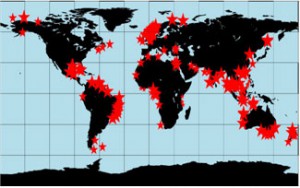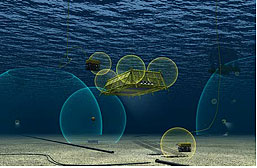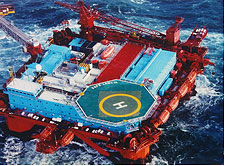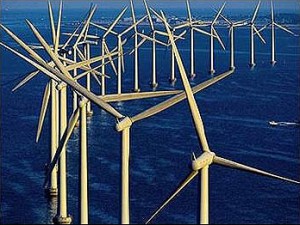It has been thoroughly established that harvesting power from fossil fuel is extremely expensive. Global warming and oil spills notwithstanding, from an ocean noise perspective the hydrocarbon industry is responsible for the lions share of marine noise pollution.
Most of the known noise comes from seismic airgun surveys – air-driven explosive impulses that penetrate the seafloor (and spread throughout the ocean) to derive geological maps of the sub-floor strata. At any given time there may be 40-50 of these surveys running concurrently, creating a din that can be heard all across the seas. [Figure 1 and Video]
Video: Seismic Survey Methods
Additionally, as offshore operations push deeper into the ocean, seafloor mounted processing equipment and thruster stabilized operations platforms bring in their own suite of noises. [Figurez 2 and 3]
While some of these noise costs will go away as we shift to carbon-neutral energy such as wind power, the shift doesn’t entirely exempt us from generating noise. There are some places where wind turbines will be mounted on tethered, floating platforms, but in most cases they will be mounted on pilings or piers which have to be sunk – or rather pounded into the seabed. The pile-driving noise is already causing problems with sea life, as indicated in a recent der Spiegel article.
Additionally, with blade diameters of up to 100 m (325 ft.) even while spinning slowly, the tip velocities can approach mach speeds with tip vortices creating a loud “thwap” as the blade tip passes by (like a slow helicopter). [Figure 4] And then there is the whining of the gear boxes…
A single ocean-sited wind turbine would probably not be much of a problem because the acoustical coupling between the ocean and the air above is not very efficient. But with wind farms and turbine parks spreading thousands of these devices over hundreds of square miles of ocean surface, the noises will combine in unpredictable ways and may create other marine noise problems.
It remains to be seen (or heard) if and what these problems might be but we do know that fossil fuel is a dead end, so we need to move ahead. The problem is that we have grown our modern civilization on the idea of “cheap energy” and have habituated to its lusty flavor. Mitigating the costs of power will ultimately be best served by using less of it.





I recently marched up a neighboring hill to complain about motorcyle noise & the Sheriff was already there–called by other neighbors. The ones with the motorcylces were contrite this time, but only because of the law enforcement guy in uniform.
My son was in the Navy & felt for the whales & porpoises who made him feel at home at sea. He wrote songs about them, but not about the Air Craft carrier’s sloshed Captain or the waste they dumped into the sea. Navy jets damaged his hearing.
Navy sonar & fossil fuel extreme exploration will kill our source of life.